IDEA 2021 is underway! This is the ninth year for Bryant’s ground-breaking Innovation and Design Experience for All (IDEA) program, an immersive design thinking "boot camp" experience for all first-year students.
Bryant’s entire campus community mobilizes to create a Silicon Valley start-up atmosphere as students develop real-time solutions for businesses and community organizations. This year, due to the pandemic, the program is fully remote, with students participating from around world. “Elevating empathy” is the guiding theme as students tackle some of the most difficult challenges and disruptions caused by the coronavirus pandemic. Each cohort will apply design thinking principles to answer the overarching question: “How might we elevate empathy, social connection, and community in a COVID world?”
About 850 students are taking part in this intensive experience with the support and guidance of nearly 200 faculty, staff, student, and alumni mentors, as well as more than 100 alumni and regional business leaders who serve as judges.
Stay tuned to this page for daily updates and highlights.
Day 1: Introduction to design thinking - empathize, define, ideate, prototype, test
“At this year’s IDEA program, we are empowering you to help the millions of people who have been disrupted by the COVID-19 pandemic,” said Allison Butler, Ph.D., Professor of Psychology and Director of the Bryant IDEA Program, as she kicked off the program this morning.
“This will be transformational,” Glenn Sulmasy, JD, LL.M., Bryant Provost and Chief Academic Officer, told students. “By the end of this, every one of you will say ‘I am a better person for having gone through this process.’”
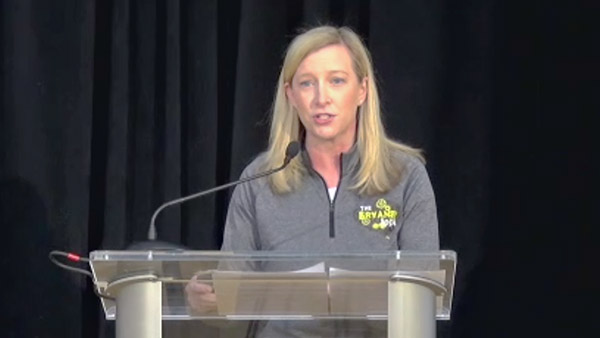
Today, the transformation began with learning the design thinking process, studying the human-centered companies that embrace the methodology, and striving to help the community groups most affected by the coronavirus – including frontline medical workers, first responders, and small business owners.
New ways of thinking
Right out of the gate, students participated in the Wallet Challenge, the first of many exercises designed to open students’ minds to a new way of thinking critically and creatively. Tasked to design the ideal wallet, students rose to the challenge and used the five stages of the design thinking process – empathize, define, ideate, prototype, test – for the first time.
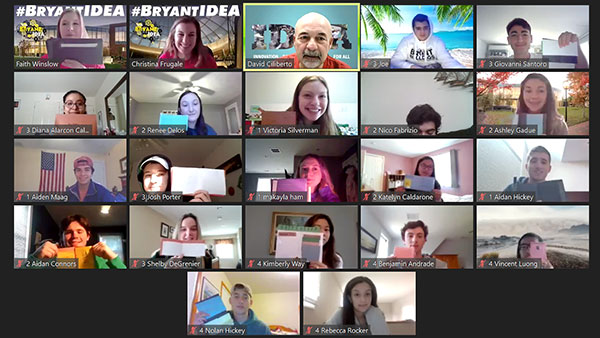
Masters of design thinking
What better way to understand the impact of design thinking than to study global brands that embrace the methodology? Students learned from two innovative companies that practice design thinking to improve the customer experience: GE designed the Adventure Series MRI machines to help alleviate children’s anxiety during an MRI scan; and Starbucks uses their prototyping lab, the Tryer Center, to bring ideas to action in 100 days.
Embracing empathy
With an understanding of design thinking principles, students got to work on the overarching challenge for IDEA 2021 – “How might we elevate empathy, social connection, and community in a COVID world?” Through field research interviews, students learned to put themselves in others’ shoes and practice empathy – a critical tool for building community, embracing diversity, and empowering successful leadership. They asked insightful questions, listened, took notes, and threw their preconceived opinions out the window.
Over the next three days, students will apply the design thinking process to create, test, and iterate viable solutions for their assigned community group.
Day 2: Empathy and ideation immersion
On Wednesday, the students' intensive training on human-centered design thinking featured workshops aimed at helping participants use their sense of empathy not only for the purposes of design thinking, but within their everyday lives.
The day began with the Empathy Keynote address, "Elevating Empathy," presented by Shola Kaye, a London-based speaker, author, and international performer. She presented a framework for being more compassionate toward others and for increasing one’s empathy and listening skills.
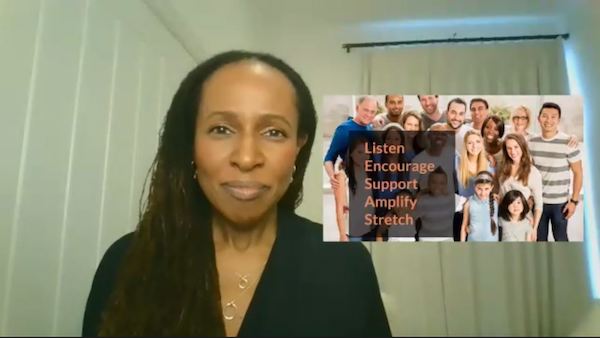
used throughout the day.
“Empathy can make you a better innovator," she said, "because you are taking the perspective of another individual," and that can lead to the best solution to a problem. Equally important, she said, is using empathy to build "a community through caring, understanding inclusion, making sure that we listen to everybody's opinion and understand where people are coming from, even when they're different than we are.”
In workshops throughout the day, the students used Kaye's empathy framework to understand problems experienced by a range of community members due to COVID: patients and older citizens; parents homeschooling their children; police and rescue workers; homeless and food-insecure individuals, and others. Using Jamboard, a virtual collaboration tool, students dove deep into the experiences of these groups, analyzing the data and observations they gathered on Tuesday through interviews with guest speakers and other sources.
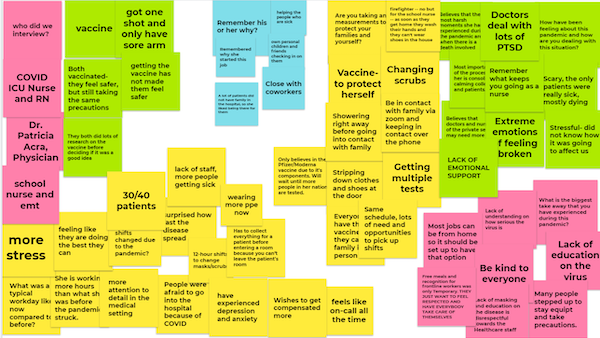
From there, the students turned to creating user journey maps – a real-world practice frequently used by organizations that embrace human-centered design. In these sessions, sponsored by Amica Insurance, the students mapped out what their group had been thinking or feeling during a particular event or throughout a typical day. The students will use the insights from this exercise to identify the source of a problem that they will work to solve by the end of the IDEA program.
The day reflected Bryant’s focus on ensuring student success – both personal and professional – in the real world.
Empathy and listening skills have a lot of real-life application, "especially in the world we’re living in,” said Accounting Instructor Maha Mitrelis, who is mentoring the cohort focusing on the police, fire, and rescue workers. The takeaway for the day, she said, is that “empathy has a role in design thinking, but let’s relate to these skills personally and realize that we’re being called to be better people.”
Day 3: Prototype and test
Innovation can be difficult, Duncan Wardle, the former Head of Innovation and Creativity at Disney and founder of iD8 & innov8, acknowledged to Bryant’s IDEA students. “We're being challenged to get out of our river of thinking more and more often because of the level of disruption that's coming,” he noted. In his Thursday keynote address, Wardle drew upon his extensive experience to show the students how to embrace creativity and become game changers and impact thinkers.
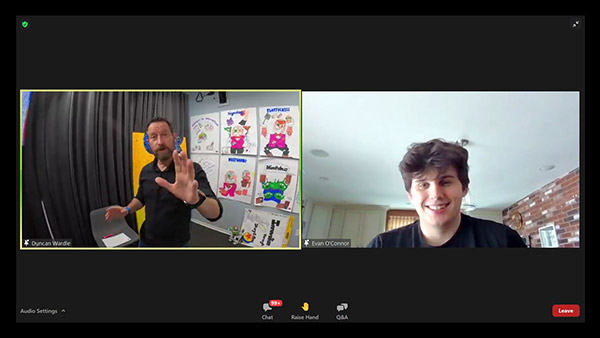
of iD8 & innov8, helped Bryant's IDEA students develop key innovation and collaboration skills.
At Disney, Wardle helped groups like Imagineering, Lucasfilm, Marvel, Pixar, and Disney Parks create groundbreaking stories and experiences. Over the course of his talk, he walked the students through how innovative companies have reimagined their industries using empathy, persistence, intuition, curiosity, and collaboration.
“In the next decade, these traits will be the most employable skill sets that you have,” he said. “You look at Google, you look at Pixar, the number one thing they're looking for is curiosity.”
Through examples taken from his incredible career – illustrated by interactive exercises – Wardle demonstrated key techniques for making the seemingly impossible possible. IDEA student Jonathan Varghese ’24 found that message inspiring. “It doesn’t matter where you start,” he mused. “It’s about how you get where you want to go.”
Turning great ideas into reality
Wardle’s advice and inspiration helped the students embrace the theme of the day: turning great ideas into actual projects and programs that help others. The morning began with discussing and reflecting on the impressions and insights they’d gathered through their field research. Asking “How might we?” questions aided them in developing new approaches and exploring the possibilities open to them.
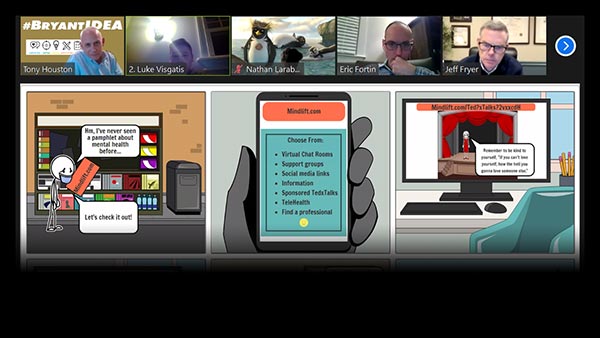
The students then worked to transform those possibilities into concrete plans with testing and prototyping. Through an exercise in brainstorming and “checkmocracy” sponsored by CVS, they selected the best elements of the ideas they liked most. A storyboarding workshop gave them tools to effectively share their proposals.
Learning from experience
Later that evening, the student cohorts presented their storyboards to their alumni mentors, who provided suggestions from with a real-world, perspective. With that feedback, the students worked into the night, perfecting their projects for the next day's showcase.
Day 4: "Rite of passage"
The final day of Bryant IDEA 2021 was the culmination of four days of students’ nearly non-stop efforts to learn and practice design thinking skills.
“The world needs empathetic, creative, innovative design thinkers now more than ever,” said Bryant University President Gittell in his closing remarks.
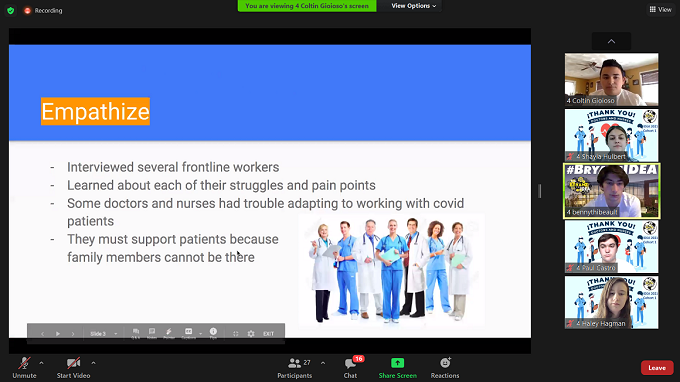
“This is a rite of passage; a way of thinking that will change your life,” added Provost and Chief Academic Officer Glenn Sulmasy, JD, LL.M. “We are the only University that commits to this type of experience for first-year students. It truly is a distinguishing mark and value proposition of the Bryant University academic experience. “

Aspiring design thinkers spent the morning refining their ideas and rehearsing their presentations for judging in the afternoon, where they are evaluated as much for their process as their results.
But, before the final moment of truth, students tapped into some inspiration and wisdom from senior executives at some of the most innovative companies in the country, organizations that have generously provided sponsorship support to the IDEA program. Bryant President Ross Gittell moderated the closing panel, “Elevating Empathy & Innovation during the Pandemic,” with Amy Carosi, Organizational Development Officer, Amica; Joseph Collette, Employee Technology Experience Director, Citizen’s Bank; Norman de Greve, Chief Marketing Officer, CVS Health; and Joceyln Murta, Tax Partner, EY.
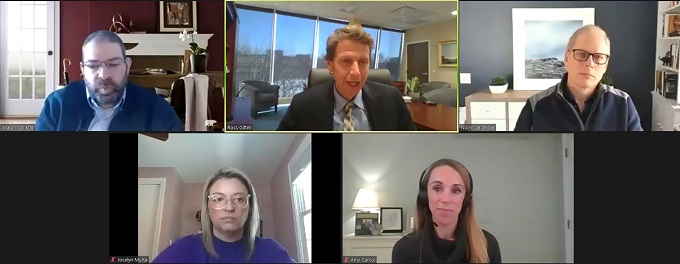
Norman de Greve, CVS; Amy Carosi, Amica; Jocelyn Murta, EY
All of these leaders, including President Gittell, have led their organizations in national and global efforts to pivot, innovate, and change how they do business in order to serve their customers and employees during the pandemic.
Congratulations!
IDEA 2021 concluded with the announcement of the winning teams from each of the 40 cohorts. Allison Butler, Ph.D., Professor of Psychology and IDEA Program Director, congratulated the students and all who have worked tirelessly since last June to make “IDEA 9.0” a success. “You did all of this remotely—more than 800 Bryant students working with 120 mentors, 200 field research interview guests, 120 judges and 80 alumni mentors spread across the globe!”
“Please take a moment and reflect on the many new skills and tools that you have gained, innovative and collaborative ways of working and thinking that you can bring with you into your classes and into your future.”